- About Us
- Columns
- Letters
- Cartoons
- The Udder Limits
- Archives
- Ezy Reading Archive
- 2024 Cud Archives
- 2023 Cud Archives
- 2022 Cud Archives
- 2021 Cud Archives
- 2020 Cud Archives
- 2015-2019
- 2010-2014
- 2004-2009
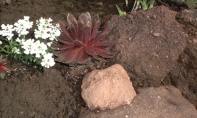 |
The Cud Short Fiction: The Rock |
1.
Mildred met Tommy on a warm, cloudless August morning when she was supposed to be pulling weeds from her mother’s garden.
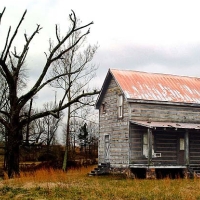 Instead of pulling weeds though -comfortably nestled within the tall corn stalks- she was sitting on a rock in the center of the garden, putting pen to paper, working on a poem.
Instead of pulling weeds though -comfortably nestled within the tall corn stalks- she was sitting on a rock in the center of the garden, putting pen to paper, working on a poem.
The big rock, a fixture in her consciousness now, had been there as far back as she could remember, and it seemed to grow out of the center of the garden like a giant potato.
It was a big garden, at least an acre, and almost perfectly square. Strangely, although she looked, no other rocks even half its size could be found anywhere near her father’s farm.
The year was 1940, and eighteen-year-old Tommy Branson, hauling hay to the local feed and seed for his dad had a blowout. He ka-thumped to a dusty stop on Fairchild Road, directly in front of Old Man White’s vegetable garden.
Out of the truck and looking at the disabled tire, the lanky, red-haired, boyish man suddenly realized the spare was ten miles away and leaning against the barn, so he helplessly kicked at a nearby dirt clump, solving nothing.
He knew he should have put the spare in the truck like his father said, but since the newly licensed driver was in a hurry to get behind the wheel of the truck, he hadn’t bothered with that insignificant, little detail.
Setting out for help across Mr. White’s field, Tommy carefully began stepping over and between rows of radishes, cucumbers, carrots, tomatoes, beans and corn.
Gradually picking up speed, he could hear his father admonishing him, “See what happens when you don’t pay attention to what you’re doing?” He picked up the pace even more, and before long he was running.
Halfway across the garden, Tommy’s foot caught on a downed corn stalk and he tumbled over. He grunted as his head painfully connected with something very hard. A few moments later he discovered what it was. He also met Mildred.
2.
Eleven-year-old Emily Branson threw her body weight against the large rounded rock, but it didn’t budge.
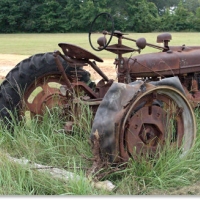 Smiling while observing Emily’s experiment, her grandmother Mildred said, “It’s a giant paper weight. It keeps the garden from blowing away.”
Smiling while observing Emily’s experiment, her grandmother Mildred said, “It’s a giant paper weight. It keeps the garden from blowing away.”
Amused by the thought of an entire garden flying through the air, Emily nodded her head and laughed as unseen fingers flipped much of her long blonde hair into her face. “I think my hair needs a paper weight too!”
Sliding her delicate hands over its smooth surface, she regarded the rock as if memorizing its every detail.
It was at least half as tall as her, and when hugging it, her arms barely held half its circumference.
“That rock is very special, you know?” Mildred offered.
“How could a plain old rock be special?” Emily replied.
“Well, I was sitting right there when I met your grampa. I should say, when ‘he’ met me. He came out of nowhere, fell, and hit his head right there!” she exclaimed, pointing. Mildred filled Emily in on that long ago day’s events.
But then, growing somber, Mildred stated flatly, “Before he left for the war, we’d come out to the garden, sit on that rock and talk for hours.” Mildred looked up into the blue sky, exhaling. Then shaking her head, she repeated, “We’d talk for hours.”
“After he…” She took another loud breath. “… died, I found I always felt closer to him when I was out here.”
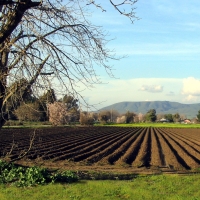 “Look, see those marks right there?” She pointed at some faint scratches on the side facing away from Emily.
“Look, see those marks right there?” She pointed at some faint scratches on the side facing away from Emily.
“These?” Emily asked, running her fingers across faint patterns of vertical slashes.
“Your grandpa made those scratches when he wasn’t much older than you are. With his pocketknife, he scratched one mark for every evening we spent out here talking.”
While Mildred’s attention was diverted toward the sound of a truck turning off of Fairchild Road, Emily quietly counted the scratches. “Wow! There are a lot of scratches here.”
“Ninety-six of them.” Mildred said without looking back.
She then turned around, pointing. “See that flat spot right there on top?” Mildred asked. “That’s where your Mom set her dolls down to play house while I tended the garden. She used to make her dolls dance there too, saying the rock was Broadway.”
“Couldn’t we live here?” Emily asked.
“No, I’m afraid not. I sold this old place so we could live in the city.”
“I miss Mom.” Emily stated.
“I know.” Mildred reassured. “That’s why I’m having this rock moved to our new garden, to help us remember her. This rock will continue holding our garden down. When you grow up, I want you to have it. I want you to know our family history so you can share it with your family one day.”
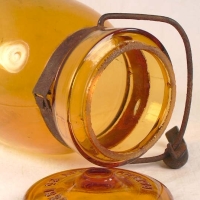 Mildred motioned for the driver to pull close to where she was standing. The driver complied and, some thirty minutes later, with the help of the truck’s other two passengers, the rock was loaded up and carried away.
Mildred motioned for the driver to pull close to where she was standing. The driver complied and, some thirty minutes later, with the help of the truck’s other two passengers, the rock was loaded up and carried away.
Mildred stood staring down at the disturbed soil where the rock had been and, recounting the emotions she’d experienced here in the center of this garden, sobbed.
“What’s this?” Emily asked.
She knelt, cleared some dirt away from a round protrusion, and using a stick, dug away at the earth. She unearthed a large glass jar.
Looking inside, she discovered a folded piece of paper. Dated August 18, 1950, and in her daughter’s hand, Mildred read the note aloud:
This poem is about a rock:
The sun is shining down
I will not frown
And the warm breeze carrying butterflies along are my Daddy’s whispers, a loving song.
Momma says that I belong
And shows me evidence of days long gone.
Scratches in the side, and a look in her eye
Rather than a paperweight, it’s an Anchor of Sentiment
Keeping loving memories alive.
